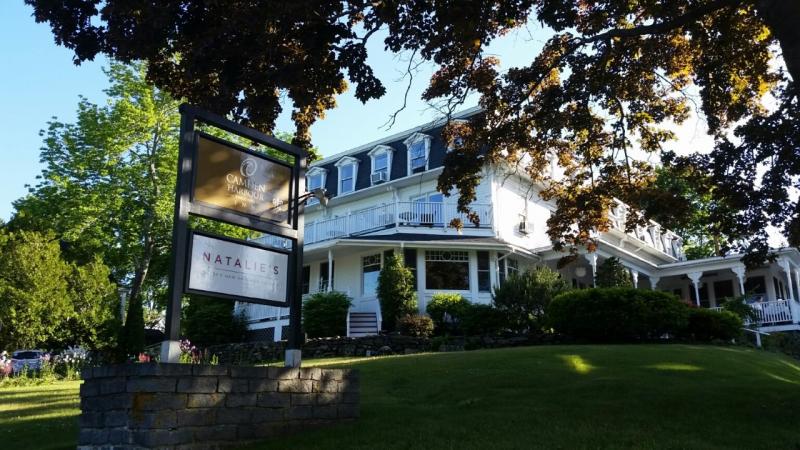Camden business files lawsuit against Small Business Administration for denying loan during pandemic
PORTLAND – A Camden inn/restaurant has filed a lawsuit in the U.S. Bankruptcy Court of the District of Maine against the U.S. Small Business Association, after its owners were denied a loan from the CARES Act of 2020 and the Paycheck Protection Program (PPP), because they had already filed for bankruptcy.
The lawsuit was filed May 4, by Breda, a Limited Liability Company, which owns and operates the Camden Harbour Inn and Natalie’s Restaurant on Bay View Street in Camden.
The court document lists Oscar Verest as the part owner and manager of Breda LLC.
Jovita Carranza is named as the defendant in her capacity as Administrator for the U.S. Small Business Administration.
The SBA filed a motion to dismiss the lawsuit June 10.
The lawsuit includes a brief history of the CARES Act (Coronavirus Aid, Relief, and Economic Stimulus Act), which was signed into law in March and passed by Congress in response to the public health and economic challenges created by the Coronavirus pandemic.
“The CARES Act of 2020 was created by the Paycheck Protection Program (PPP), a program administered by the Small Business Administration (SBA) to provide small loans and stimulus funds to assist small businesses and nonprofits. The SBA defines the PPP as a loan designed to provide a direct incentive for small businesses to keep their workers on the payroll,” according to the suit.
The lawsuit further describes the PPP, “as a loan program where the disbursements actually become grants with no repayment obligations if among other requirements, 75 percent of the PPP funds are used for payroll and wage expenses.”
Breda LLC said that its hospitality and restaurant businesses have been significantly impacted by COVID.
On April 30, the company learned its application for a loan was denied and were informed by a local bank that Breda LLC did not meet the criteria of the PPP because they had filed for bankruptcy, the suit said.
Breda LLC stated in its application, “that their purpose in seeking the PPP grant was to retain workers and maintain payroll, make other payments such as mortgage and interest payments, all of which are consistent with Congress’s purpose in passing the PPP, ” according to the suit.
The attorneys, Attorneys D. Sam Anderson and Adam R. Prescott of Bernstein Shur Sawyer and Nelson, PA in Portland, for Breda LLC contend that, “the debtor has a legal right to apply for the funds under the PPP and have its application considered on the same terms as other applicants without regard to its status as a debtor under Chapter 11 of the bankruptcy code.”
They also claim that the debtor is a small business in the meaning of the CARES Act and is eligible and the administrator of the SBA is discriminating against debtors by refusing them an opportunity to participate in PPP, soley because a company is involved in bankruptcy.
The SBA determined that providing PPP loans to debtors in bankruptcy would present an unacceptably high risk of an unauthorized use of funds or non-repayment of unforgiven loans. In addition, they claim that the bankruptcy code does not require any person to make a loan or a financial accommodation to a debtor in bankruptcy.
According to the lawsuit, on April 24, concurrent with Congress’ extension of additional PPP funding, the SBA posted a new final interim rule which was then published in the Federal Register April 28.
The ruling states that, “if the applicant or the owner of applicant is the debtor in a bankruptcy proceeding, either at the time it submits the application or at any time before the loan is disbursed, the applicant is ineligible to receive a PPP loan.”
The SBA determined that providing loans to debtors in bankruptcy would present an unacceptably high risk of an unauthorized use of funds or non-repayment of unforgiven loans. They said they have a duty to implement the laws enacted by Congress. In addition, the SBA states that the 525 (a) Bankruptcy Code does not require any person to make a loan or a financial accommodation to a debtor in bankruptcy, the lawsuit states.
The attorneys for Breda LLC counter, “that the SBA has violated the bankruptcy code with respect to their client’s application and has also violated the same code by issuing its interim final rule on April 24 and having a PPP application form that excludes debtors.”
Breda LLC is seeking damages in an amount not less than $220,777.
The Litigation Branch, Civil Division, of the U.S. Department of Justice in Washington, D.C. is representing Jovita Carranza, the administrator for the SBA.
Related story:
https://www.penbaypilot.com/article/update-camden-harbour-inn-auction-cancelled/98287
Sarah Shepherd can be reached at news@penbaypilot.com
Event Date
Address
United States


























